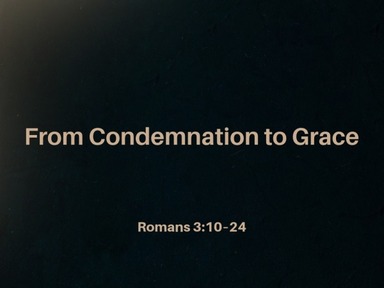From Condemnation to Grace

From Condemnation to Grace
The Universal Condition of Sin
That no one has done good, not even one, is a hard saying and difficult to understand. How is it possible that no one, Jew or Greek, has ever done anything good? Are we supposed to believe that nobody has ever shown hospitality, fed the hungry, clothed the naked, delivered the innocent from the hands of the powerful or done anything similar? It does not seem possible to me that Paul was intending to assert anything as incredible as that. I think that what he meant must be understood as follows. If someone lays the foundation for a house and puts up one or two walls or transports some building materials to the site, can he be said to have built the house, just because he has set to work on it? The man who will be said to have built the house is the one who has finished off each and every part of it. So I think that here the apostle is saying that no one has done good in the sense that no one has brought goodness to perfection and completion. If we ask ourselves who is truly good and who has done good perfectly, we shall find only him who said: “I am the good shepherd,” and again: “The good shepherd lays down his life for the sheep.”